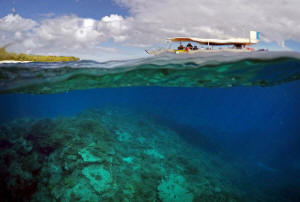|
 Half
Australia's Great Barrier Reef coral 'dead or dying': scientists Half
Australia's Great Barrier Reef coral 'dead or dying': scientists
 Send a link to a friend
Send a link to a friend
[April 20, 2016]
By Colin Packham
SYDNEY (Reuters) - Australian scientists
said on Wednesday that just seven percent of the Great Barrier Reef,
which attracts around A$5 billion ($3.90 billion) in tourism every year,
has been untouched by mass bleaching that is likely to destroy half the
coral.
|
|
 Bleaching occurs when the water is too warm, forcing coral to
expel living algae and causing it to calcify and turn white. Mildly
bleached coral can recover if the temperature drops, otherwise it
may die. Bleaching occurs when the water is too warm, forcing coral to
expel living algae and causing it to calcify and turn white. Mildly
bleached coral can recover if the temperature drops, otherwise it
may die.
Although the impact has been exacerbated by one of the strongest El
Nino weather systems in nearly 20 years, scientists believe climate
change is the underlying cause.
"We've never seen anything like this scale of bleaching before. In
the northern Great Barrier Reef, it's like 10 cyclones have come
ashore all at once," said Professor Terry Hughes, conveyor of the
National Coral Bleaching Taskforce, which conducted aerial surveys
of the World Heritage site.
 "Our estimate at the moment is that close to 50 percent of the coral
is already dead or dying," Hughes told Reuters.
The Great Barrier Reef stretches 2,300 km (1,430 miles) along
Australia's northeast coast and is the world's largest living
ecosystem.
"There were some who said that the worst had passed. We rejected
that, and they were wrong," Environment Minister Greg Hunt told
reporters. "Let it be known that this is a significant event. We
take it seriously."
U.S. President Barack Obama embarrassed Australia 18 months ago by
warning of the risk of climate change to the reef during a G20
meeting.
UNESCO's World Heritage Committee last May stopped short of placing
the Great Barrier Reef on an "in danger" list, but the ruling raised
long-term concerns about its future.
Australia is one of the largest carbon emitters capita because of
its reliance on coal-fired power plants for electricity.
[to top of second column] |

Despite pledging to cut carbon emissions, Australia has continued to
support fossil fuel projects, including Adani Enterprises Ltd's
proposed A$10 billion ($7.7 billion) Carmichael coal project in the
Galilee Basin in western Queensland.
"It’s not good enough for them to say they care about the reef while
they keep backing the coal industry and avoid tackling climate
change,” said Shani Tager, a Greenpeace campaigner.
The findings will likely place pressure on Prime Minister Malcolm
Turnbull ahead of an expected federal election on July 2.
Turnbull is an advocate of carbon trading and supports progressive
climate policies, but has left some disappointed over a failure to
strengthen his party's commitment to addressing climate change.
($1 = A$1.28)
(Additional reporting by James Regan; Editing by Nick Macfie)
[© 2016 Thomson Reuters. All rights
reserved.]
Copyright 2016 Reuters. All rights reserved. This material may not be published,
broadcast, rewritten or redistributed.
 |